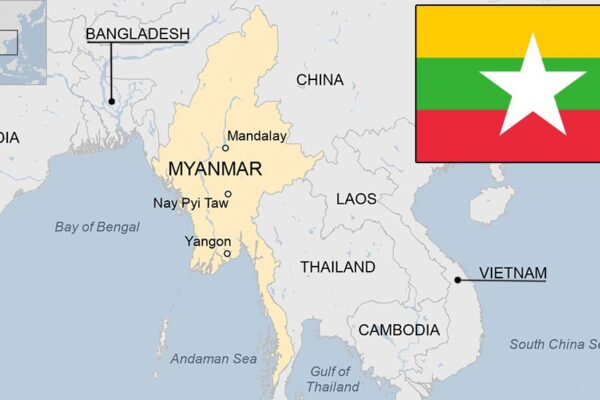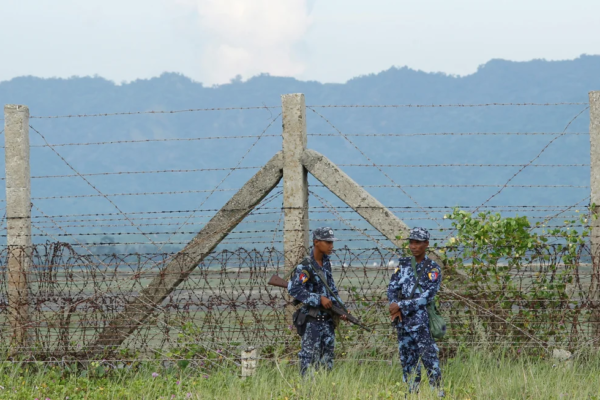China demolishes prominent Xinjiang building owned by Uyghur activist in US
A symbolically important building in Xinjiang’s capital that was instrumental in the emergence of Uyghur entrepreneurs and businesspeople in the 1990s has been demolished, Radio Free Asia has learned. Authorities destroyed the Rebiya Kadeer Trade Center in Urumqi on Nov. 29, said Zumret Dawut, a Uyghur internment camp survivor now in the United States, citing sources from inside China’s far-western region of Xinjiang. The building had been shuttered for 15 years. Other sources in Xinjiang, including police officers and a tourism worker, confirmed the demolition, and satellite photos show debris where the building once stood on a corner of downtown Urumqi, near the Grand Bazaar. Built in 1990, the seven-story Rebiya Kadeer Trade Center, including the adjacent Akida Trade Center, was a 30,000-square-meter (323,000-square-foot) space with over 600 shops, conference rooms, wedding halls, classrooms and hotel rooms. Besides promoting the development of Uyghur entrepreneurs, the center became a meeting place for intellectuals, a training ground for young researchers and a starting point for philanthropists. The red arrow points to the Rebiya Kadeer Trade Center in Urumqi, capital of northwestern China’s Xinjiang Uyghur Autonomous Region, Sept. 9, 2009. Dawut’s sources told her that the building was imploded. She also said she closely monitored Chinese state media and social media platforms, including Douyin, China’s version of TikTok, for more information or videos, but found nothing. Strict security measures were implemented the day the building was torn down, Dawut learned from her sources, and the road where the trade center was located and surrounding streets were placed under surveillance. Before authorities destroyed the trade center, they distributed notices about closing nearby shops and buildings and restricted access to tourist sites. “I was told that the store owners were instructed to keep their shops closed on the day of the demolition, and no one was allowed in the area,” she said. When RFA contacted police and other officials in Urumqi about the building’s fate, most warned that the topic was sensitive and declined to answer questions when Kadeer’s name was mentioned. ‘Sensitive topic’ A police officer at the Urumqi Ghalibiyat Police Station said the situation was normal and that foreign tourists could visit the area around the Grand Bazaar, but he did not deny the building’s demolition. RELATED STORIES Sister of Uyghur Rights Advocate Rebiya Kadeer Confirmed to Have Died After Release From Detention ‘More Than 30’ Relatives of Uyghur Exile Leader Rebiya Kadeer Detained in Xinjiang Uyghur Leader’s Family Evicted World Cannot Turn a Blind Eye: Rebiya Kadeer China Frees Rebiya Kadeer “The Grand Bazaar can still be toured, and the museums are open for visits,” the officer said. “However, there is no longer a Rebiya Trade Center. You can’t refer to it by that name at this moment. It’s a sensitive topic.” When asked why the building was demolished, the officer said she and others at the police station had heard something about it but could not provide details because of the topic’s sensitivity. A duty officer at the city police’s external affairs department said the Kadeer building was demolished on Nov. 29 by municipal construction workers. But she said she did not have further information. A staff member from a tourism agency in Urumqi also confirmed the center’s destruction. “The Rebiya Kadeer Trade Center has already been demolished,” she said. “I haven’t been there since it’s in ruins, and everything is a mess.” A government worker in Urumqi who declined to give his name said authorities tried to carry out the demolition as quietly as possible, but the sound of the building imploding and police presence on surrounding streets created more fear in the already uneasy city. A view of the facade of the Rebiya Kadeer Trade Center in Urumqi, capital of northwestern China’s Xinjiang Uyghur Autonomous Region, Sept. 9, 2009. An officer from the Nanhu Police Station near the Kadeer building who was on duty around the Grand Bazaar on Nov. 29 suggested that others’ accounts were exaggerated and noted that few policemen were needed during the demolition because Urumqi’s streets are filled with surveillance cameras. “The demolition was carried out without causing any panic,” she said. 1999 arrest When Kadeer lived in Xinjiang, she was politically active and held positions in China’s National People’s Congress in Beijing and in other political bodies prior to her arrest in Urumqi in 1999 while en route to a meeting with a U.S. Congressional staff delegation. Chinese authorities accused her of sending confidential internal reports to her husband, who at the time worked as a broadcaster for Radio Free Asia and Voice of America in the U.S. Kadeer was released on medical parole in 2005 and fled to the United States, where she took on leadership positions in overseas Uyghur organizations, including the World Uyghur Congress. After deadly unrest between Muslim Uyghurs and Han Chinese in Urumqi in July 2009, Chinese authorities accused Kadeer, who was not present at the time, of being an instigator of the turmoil, and permanently shuttered her trade center. Translated by RFA Uyghur. Edited by Roseanne Gerin and Malcolm Foster. We are : Investigative Journalism Reportika Investigative Reports Daily Reports Interviews Surveys Reportika









